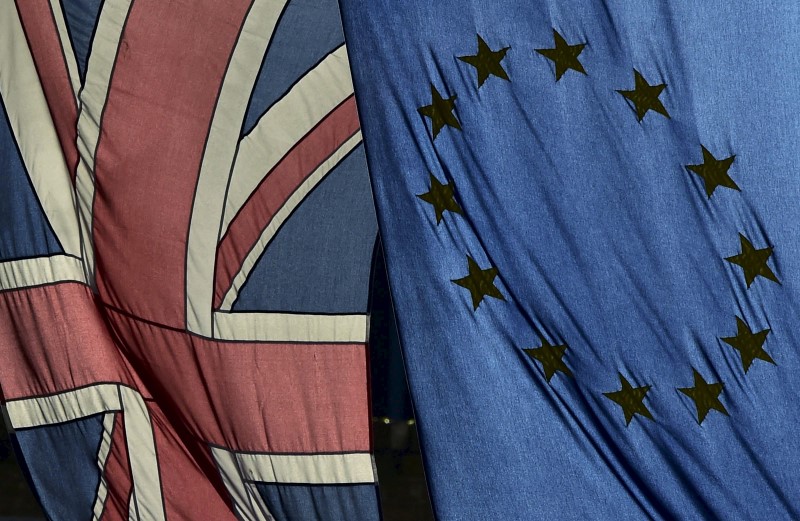By Paul Taylor
BRUSSELS (Reuters) - European history may be about to go into reverse.
If Britain votes to leave the European Union, it will likely start a process of fragmentation of the political and security structures on which the post-World War Two and post-Cold War European order was built.
Even if the British step back from the brink on Thursday, the bruising legacy of the debate, the growing trend of national referendums on EU issues and the backlash against globalisation and internationalised elites on both sides of the Atlantic will not fade away any time soon.
How far and how fast contagion may spread in case of a Brexit vote, no one can know. Just don't expect it to stop with one major country walking away from the EU.
European Council President Donald Tusk, a historian and former Polish prime minister who took part in the struggle to overthrow Soviet-imposed communist rule in eastern Europe and join the EU, was both a witness and an actor in that history.
Tusk, who knows from personal experience what it means to be on the wrong side of a wall or border, warned last week: "Brexit could be the beginning of the destruction not only of the EU but also of Western political civilisation in its entirety."
He is equally aware that if British Prime Minister David Cameron succeeds in turning public opinion in the final days and winning the referendum, his tactics of demanding a renegotiation of EU membership terms using a plebiscite as leverage are bound to tempt politicians in other countries.
In private, there is anger at Cameron among EU leaders and diplomats who feel he has played Russian roulette with Europe's future in a failed bid to end civil war in his own party.
In case of a Brexit, EU founders Germany and France will work to shore up the remaining EU and put forward new projects in security and defence. But their lack of agreement on how to strengthen the euro zone - and the prospect of anti-EU populists gaining in elections in those countries next year - makes any big integration initiative impossible for now.
POPULISTS WINNING?
The forces of European disintegration are on the rise in many countries, fuelled by economic discontent, fear of job losses to foreign competition or to immigrants, and the anxieties of ageing societies.
Eurosceptics in the Netherlands forced a referendum in April on an EU agreement on closer ties with Ukraine via a petition and mobilised just enough voters to make the "No" vote valid, leaving the Dutch and EU authorities with a legal conundrum.
Hungarian Prime Minister Viktor Orban, who boasts of having established an "illiberal democracy", is planning a public vote in October to defy EU rules obliging member states to share the burden of taking in refugees flooding into Greece and Italy.
And a eurosceptic rightist failed by a whisker to win Austria's presidential election last month, surfing a wave of hostility to migrants and defiance of "Brussels".
The latest Pew Research Center survey of European attitudes shows public support for the EU has plunged across Europe, with the steepest fall in France, where only 38 percent have a favourable view of the Union, six points fewer than in Britain.
Such findings do not necessarily indicate that other countries are likely to leave the bloc. Ironically support for the EU is strongest in Poland and Hungary, which are major beneficiaries of funds from Brussels but have two of Europe's most eurosceptic governments.
But public hostility to sharing risks - financial, humanitarian or geopolitical - had gained ground around Europe even before the British vote, widening north-south and east-west gaps within the EU.
"In a sense, the populists have already won, because they are setting the agenda for the mainstream parties," said Heather Grabbe, a visiting fellow at the European University Institute in Florence.
Among those most alarmed are strategists in the United States and at NATO, the transatlantic defence alliance, who are convinced that a British vote to leave the EU would weaken the unity of the West and its resolve to tackle security challenges.
Those include a more assertive Russia, Islamist militancy, war in the Middle East and North Africa that has put millions of refugees on the move, migratory pressures from sub-Saharan Africa and cyberattacks on economic and security networks.
London has long been Washington's go-to partner in defence and intelligence but it has been more reluctant to join military action since the unpopular U.S.-led Iraq and Afghanistan wars.
NATO is straining now to find European nations willing to deploy modest numbers of troops in rotation to support Baltic and East European allies alarmed by Russia's 2014 seizure of Crimea and support for pro-Russian rebels in eastern Ukraine.
Some Brexit advocates contend that the EU is "yesterday’s story" and that leaving would allow the UK to be more global.
Yet a Leave vote would sidetrack the European Union for several years in divisive debates about the terms of the divorce with Britain, its second largest economy and military power.
It would make the UK more inward-looking, with both main political parties mired in recrimination and an emphasis on shutting borders rather than on the British tradition of liberal intervention.
"The project of European construction that began in the aftermath of World War Two and that has done so much to ensure that Europe did not again become a venue of instability and violence would be further endangered," said Richard Haas, president of the Council on Foreign Relations in the United States and a former State Department policy planner.
Writing in The American Interest magazine, Haas noted that for U.S. strategists, the continent that sparked two world wars had become "boring" after the end of Cold War.

Brexit alone would not make Europe that much more interesting, he said, but it would contribute to the slow unravelling of a stable European order, leaving both the EU and the UK "weaker and more divided".